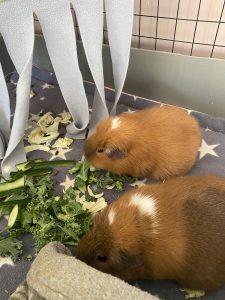What Foods Do Guinea Pigs Eat? A Comprehensive Guide
What Foods Do Guinea Pigs Eat? A Comprehensive Guide
As a guinea pig owner, you might find yourself wondering, “What foods do guinea pigs eat?” While these adorable little creatures are not overly demanding when it comes to their diet, it’s essential to know what foods are safe for them and which ones should be avoided. This blog post will provide a comprehensive guide on the best food choices for your furry friend.
Understanding the Guinea Pig Diet
Guinea pigs are herbivores, meaning they primarily eat plant-based foods. Their diet in the wild consists of grasses, leaves, and some fruits and vegetables. However, domesticated guinea pigs rely on their owners to provide a balanced diet that meets all their nutritional needs.
The primary component of a guinea pig’s diet should be high-quality hay. Hay is crucial for their digestive health and dental care as it helps wear down their continuously growing teeth. Timothy hay is often recommended due to its high fiber content and lower calcium levels compared to other types of hay.
In addition to hay, guinea pigs also need fresh vegetables and fruits daily. These provide essential vitamins and minerals that they cannot produce themselves, particularly Vitamin C. However, not all fruits and vegetables are safe for guinea pigs; some can cause digestive problems or other health issues.
Safe Fruits and Vegetables for Guinea Pigs
So what foods do guinea pigs eat when it comes to fruits and vegetables? Here’s a list of some safe options:
1. Leafy Greens: Romaine lettuce, kale, spinach, parsley, are all excellent choices.
2. Vegetables: Bell peppers (especially red ones as they’re rich in Vitamin C), cucumbers, zucchini, carrots (including tops), peas.
3. Fruits: Apples (without seeds), pears (without seeds), bananas (in moderation due to high sugar content), strawberries, blueberries.
Remember to wash all fruits and vegetables thoroughly before feeding them to your guinea pig to remove any pesticides or chemicals. Also, introduce new foods gradually to avoid upsetting their digestive system.
Foods to Avoid
While guinea pigs can eat a variety of fruits and vegetables, there are some they should avoid. These include:
1. Avocados: They are high in fat and can cause digestive issues.
2. Potatoes and other nightshade vegetables: These can be toxic to guinea pigs.
3. Onions, garlic, leeks: These can cause bloating and other digestive problems.
4. Rhubarb: It’s toxic for guinea pigs.
5. Exotic fruits like pineapples and citrus fruits: They are too acidic. 6. Iceberg lettuce can cause diarrhoea
Also, avoid feeding your guinea pig any processed human foods like bread, crackers, sweets, or dairy products as these can cause serious health problems.
Supplementing with Pellets
In addition to hay and fresh produce, you might want to consider supplementing your guinea pig’s diet with specially formulated pellets. These pellets are designed to provide the necessary nutrients that might be missing from their diet.
When choosing pellets for your pet, look for ones that are high in fiber but low in protein and calcium. Avoid colorful mixtures that contain seeds or dried fruit as these often contain added sugars and can lead to selective eating.
Conclusion
Understanding what foods do guinea pigs eat is crucial for their health and wellbeing. A balanced diet of hay, fresh vegetables and fruits, supplemented with high-quality pellets will ensure your pet gets all the necessary nutrients they need.
Remember always to introduce new foods gradually and monitor your pet for any changes in behavior or bowel movements after introducing a new food item. If you notice anything unusual or if your pet refuses food altogether, it’s best to consult a vet immediately.
By providing a varied diet based on safe and nutritious foods, you’ll not only keep your guinea pig healthy but also enrich their life with new tastes and textures. Happy feeding!
See our full range of indoor guinea pig cages here https://candcguineapigcages.co.uk/standard-cages/



